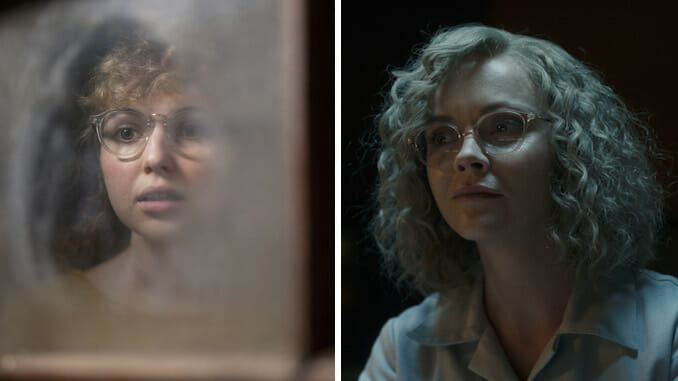Yellowjackets: Unraveling the Terrifying, Fascinating Misty Quigley
Photo Courtesy of Showtime
Showtime’s Yellowjackets is one of the best series that far too few people are watching, a deliciously savage and disturbingly clever study of human nature that combines the best aspects of Lord of the Flies, Lost, and The OA into something that feels both entirely fresh and deeply necessary. The story of a stranded girls soccer team, the desperate acts they’re driven to commit to survive for 19 months while lost in the wilderness, and the way their choices during this dark period reverberate throughout the rest of their lives, the show is bursting with complex, morally gray characters (alongside banging 1990s needle drops).
Rarely do we get the chance to watch a story that so specifically embraces things like violence, betrayal, and, yes, cannibalism through a female lens. There are unrequited crushes, disintegrating friendships, new hook-ups, sexual double standards, and major character revelations driven by the fact that the girls’ menstrual cycles sync up. We’re all used to teen dramas that frame young women’s stories around the complex hierarchies the patriarchy often forces them to compete within, or that see them as victims in a system that is much larger and older than they are. But Yellowjackets is more interested in how the girls relate to one another and the ways that their time in the woods impacts them, both collectively and as individuals. And the series’ dual timeline format, which shows us the young women as both stranded teenagers and survivors still trying to navigate life in the aftermath of this experience 25 years later, allows us to see the scars that have never fully healed in all their grisly detail.
As with any show about teen girls, there are plenty of tropes and archetypes: peppy queen bee Jackie (Ella Purnell) and her unassumingly mousy yes-woman Shauna (Sophie Nélisse as a teen, Melanie Lynskey as an adult); burnout Natalie (Sophie Thatcher/Juliette Lewis); bossy Taissa (Jasmin Savoy Brown/Tawny Cypress); rich girl Lottie (Courtney Eaton), who’s struggling with what is either mental illness or spiritual visions depending on who you ask. That all these girls turn out to be so much more than the neat boxes popular culture generally expects their characters to fit into is part of the fun of the show, and the reason Yellowjackets makes for such a consistently compelling watch.
Yet, no character is as deeply weird or wildly interesting as Misty Quigley (Samantha Hanratty/Christina Ricci), the socially awkward, nerdy Yellowjackets team equipment manager who comes into her own in the woods, finding her (occasionally deadly) purpose and sense of belonging that her high school days so often denied her. Yes, Misty’s a complete sociopath who destroys the airplane black box that might have seen her and her teammates rescued before they had to start eating each other, but her genuine longing for acceptance and friendship is so compelling and relatable that it’s difficult to outright hate her for what she’s done. (Or continues to do in the present-day storyline, which involves everything from simple blackmail to kidnapping and elder abuse.)
Part of the reason for that is Misty is a major factor in the group’s survival in the first place. She’s decisive, quick on her feet, and knows what to do for many of the injuries and various other problems that crop up in the immediate aftermath of the plane crash. She’s the one who makes the difficult choices—like chopping off the leg of the team’s assistant coach to save his life. And, in her way, Misty is quite brave, willing to step out of her comfort zone and take risks in a way others (read: Jackie) simply are not. The fact that she doesn’t know how to emotionally process finally getting some of the long-awaited validation she’s longed for all her life… well, how much of that is her fault and how much is due to the society that so cruelly denied it to her?
Misty is the only one of the girls who arrived in the woods already traumatized, the victim of a teenage social hierarchy that told her day in and day out that she was worthless, that made her the constant butt of jokes she wasn’t in on, that delighted in humiliating and belittling her. Is it any wonder that the first time she’s allowed to be part of the popular kids’ group for real it all goes (dangerously) to her head, and she is suddenly as willing to serve as their captor as she is their savior? They say it’s better to reign in hell than serve in heaven, after all.